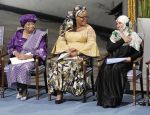By Bjoern H. Amland
OSLO, Norway (AP)— Three women who fought injustice, dictatorship and sexual violence in Liberia and Yemen accepted the 2011 Nobel Peace Prize Dec. 10, calling on repressed women worldwide to rise up against male supremacy.
“My sisters, my daughters, my friends—find your voice,” Liberian President Ellen Johnson Sirleaf said after collecting her Nobel diploma and medal at a ceremony in Oslo.
Sirleaf, Africa’s first democratically elected female president, shared the award with women’s rights campaigner Leymah Gbowee, also from Liberia, and Tawakkul Karman, a female icon of the protest movement in Yemen.
The peace prize was announced in October, along with the Nobel awards for medicine, physics, chemistry, literature and economics. Worth 10 million kronor ($1.5 million) each, the Nobel Prizes are always handed out on the anniversary of award founder Alfred Nobel’s death on Dec. 10, 1896.
By selecting Karman, the prize committee recognized the Arab Spring movement that has toppled autocratic leaders in North Africa and the Middle East. Praising Karman’s struggle against Yemen’s regime, Nobel committee chairman Thorbjoern Jagland also sent a message to Syria’s leader Bashar Assad, whose crackdown on rebels has killed more than 4,000 people according to U.N. estimates.
“President Assad in Syria will not be able to resist the people’s demand for freedom of human rights,” Jagland said.
Karman is the first Arab woman to win the prize and, at 32, the youngest peace laureate ever. A journalist and founder of the human rights group Women Journalists Without Chains, she also is a member of the Islamic party Islah.
In her acceptance speech, Karman paid tribute to Arab women and their struggles “in a society dominated by the supremacy of men.”
According to an English translation of her speech, delivered in Arabic, she criticized the “repressive, militarized, corrupt” regime of outgoing President Ali Abdullah Saleh. She also lamented that the revolution in Yemen hasn’t gained as much international attention as the revolts in Egypt, Tunisia, Libya and Syria.
“This should haunt the world’s conscience because it challenges the very idea of fairness and justice,” Karman said.
No woman or sub-Saharan African had won the prize since 2004, when the committee honored Wangari Maathai of Kenya, who mobilized poor women to fight deforestation by planting trees.
Sirleaf, 73, was elected president of Liberia in 2005 and won re-election in October. She is widely credited with helping her country emerge from an especially brutal civil war.
The Nobel chairman noted that she initially supported Charles Taylor but later dissociated herself from the former rebel leader who is now awaiting judgment from the International Criminal Court on charges of war crimes in Sierra Leone.
Gbowee, 39, challenged Liberia’s warlords as she campaigned for women’s rights and against rape. In 2003, she led hundreds of female protesters through Monrovia to demand swift disarmament of fighters, who continued to prey on women, despite a peace deal.
“We used our pains, broken bodies and scarred emotions to confront the injustices and terror of our nation,” she told the Nobel audience in Oslo’s City Hall.
She called the peace prize a recognition of the struggle for women’s rights not only in Yemen and Liberia, but anywhere that women face oppression.
“We must continue to unite in sisterhood to turn our tears into triumph,” Gbowee said. “There is no time to rest until our world achieves wholeness and balance, where all men and women are considered equal and free.”
This year’s prize generated less controversy than the 2010 award, which went to imprisoned Chinese dissident Liu Xiaobo, infuriating China’s leadership. Xiaobo was represented by an empty chair at the award ceremony.
